|
|
|
Sort Order |
|
|
|
Items / Page
|
|
|
|
|
|
|
| Srl | Item |
| 1 |
ID:
145524
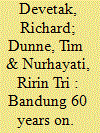

|
|
|
|
|
| Summary/Abstract |
This article examines the extent to which international society has been able to accommodate challenges such as the mid twentieth-century ‘revolt against the West’ and the twenty-first-century rise of new (especially non-Western) great powers. The Bandung conference of 1955 has commonly been seen as posing a threat to the fabric of international society by proliferating cultural and political differences. The authors show, on the contrary, that the political project of anti-colonialism and peaceful coexistence expressed at Bandung was actually consistent with a pluralist conception of international society, even if Western powers and intellectuals at the time failed to notice. The non-Western countries represented at Bandung were intent on expunging international society of the structures and practices of racism and colonialism so as to strengthen the foundations of a pluralistic international society better able to accommodate cultural and political differences.
|
|
|
|
|
|
|
|
|
|
|
|
|
|
|
|
| 2 |
ID:
147203
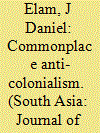

|
|
|
|
|
| Summary/Abstract |
Bhagat Singh (1907–31) is popularly celebrated as one of the major leaders of the Indian anti-colonial movement. Scholars have pointed to his writings to demonstrate his philosophical mastery. One of the primary texts used to support this claim is the activist's jail notebook, a collection of reading notes Bhagat Singh produced while in jail. The existence of the jail notebook, however, has only been used as proof of Bhagat Singh's mastery, rather than as possibly articulating its own philosophy for anti-colonial revolution. This essay analyses Bhagat Singh's jail notebook in order to offer a theory of ‘commonplace anti-colonialism’ and inconsequence. Rather than use the jail notebook to corroborate Bhagat Singh's ‘mastery’ as an anti-colonial revolutionary thinker, this essay argues that the jail notebook reveals a more radical revolutionary politics: of reading. Bhagat Singh's reading practices, especially in the face of death, suggest a new way to theorise ‘revolution’ as the perpetual deferment of authority and mastery, rather than the eventual assumption of those positions. Consequently, ‘inconsequential reading’ may, in turn, reveal a more radically egalitarian politics of revolution than previously ascribed to Bhagat Singh.
|
|
|
|
|
|
|
|
|
|
|
|
|
|
|
|
| 3 |
ID:
096822
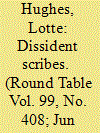

|
|
|
|
|
| Publication |
2010.
|
| Summary/Abstract |
Despite a growing body of work on anti-colonialist movements and the activities of individual activists, there remain large gaps in our knowledge of early agitation in and around Africa, and the links between people. A scholarly focus on transnational networking in the 1930s to 1950s tends to overshadow earlier agitation, by people whose achievements are too often forgotten now, but who laid the foundations for later struggle, decolonisation, and modern-day humanitarian activity. This article discusses some lesser-known agitators, both European and African, active in Africa in the 1900s (though Colenso began earlier), who used copious correspondence, the press and humanitarian networks to highlight colonial abuses and challenge imperial policy. It focuses largely on, and draws parallels between, Dr Norman Leys (working in East Africa), Henry Nevinson (West Africa), F. Z. S. Peregrino (West and South Africa) and Harriette Colenso (South Africa).
|
|
|
|
|
|
|
|
|
|
|
|
|
|
|
|
| 4 |
ID:
191064
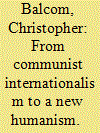

|
|
|
|
|
| Summary/Abstract |
This paper investigates the thought of the Indian revolutionary and philosopher M.N. Roy (1887–1954). The essay argues that Roy’s pivot from Marxism to a liberal ‘New Humanism’ over the course of the 1930s and 1940s was shaped by his thinking about fascism and represents a broader turn away from a materialist reading of history and loss of confidence in the Indian working class. The paper begins with an analysis of Roy’s early communism, and considers his later critique, elaborated from the 1930s onwards, that ‘Gandhism’ represented an Indian form of fascism, and explores how these arguments led to his rejection of Marxism.
|
|
|
|
|
|
|
|
|
|
|
|
|
|
|
|
| 5 |
ID:
192315
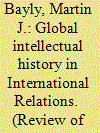

|
|
|
|
|
| Summary/Abstract |
The Eurocentric critique of the International Relations discipline has brought welcome attention to non-European international thinkers, and anti-colonial or anti-imperial thinkers in particular. Frequently these thinkers and associated movements are rightly described in thematic terms of emancipation, equality, and justice, in opposition to the hierarchical worldview of empires and their acolytes. Notwithstanding the broad validity of this depiction, a purely oppositional picture risks obscuring those aspects of ‘non-European’ international thought that evade simple categorisation. Drawing upon archival material and historical works, this article applies approaches offered by global intellectual history to the works of late colonial Indian international thinkers, exploring the mixed registers of equality and hierarchy, internationalism and imperialism present in their writings. Concentrating on three ‘sites’ connected by the common themes of diaspora and mobility: the plight of Indians overseas in East Africa; the concept of ‘greater India’; and the international political thought of Benoy Kumar Sarkar, the article complicates the internationalism/imperialism divide of the early twentieth century, showing how ostensibly opposed scholarly communities sometimes competed over similar forms of knowledge and ways of ordering the world. This offers a framework by which the contributions of global intellectual history can be applied to the study of international political thought.
|
|
|
|
|
|
|
|
|
|
|
|
|
|
|
|
| 6 |
ID:
190717
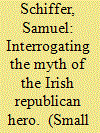

|
|
|
|
|
| Summary/Abstract |
This essay seeks to understand how since the signing of the Good Friday Agreement in 1998, marking the end of The Troubles in Northern Ireland, filmic depictions of the conflict reinterpret and interrogate the traditional role of the ‘hero’ in the Irish republican cause. In an analysis of two films released after the Good Friday Agreement, Hunger (2008) and The Wind that Shakes the Barley (2006), this essay argues that both films feature a hero-type Irish republican waging a brave-but-futile campaign against British oppression, but critique the myth of the Irish republican hero by severing the cycle of mythical violence by sowing doubt in the hero myth that serves as its base. This essay suggests that film is a low-stakes arena for the interrogation of volatile narratives that plays an important role in the reconceptualization of a conflict and, maybe even, its resolution.
|
|
|
|
|
|
|
|
|
|
|
|
|
|
|
|
| 7 |
ID:
154552
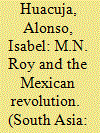

|
|
|
|
|
| Summary/Abstract |
This essay examines the Indian anti-colonial and Leftist activist M.N. Roy's political work in Mexico from 1918 to 1920. It argues that Roy's sojourn in revolutionary Mexico—and in particular the friendships he made there with Leftist intellectuals, some Mexican, many newcomers to Mexico—played an important role in shaping his political trajectory. Not only did Roy become a communist in Mexico, but he and his colleagues, concerned with the ‘universal’ struggle of the working class, dismissed ideas about national identity brewing during the Mexican Revolution and its aftermath. Roy's distaste for national pride also defined his later political work in India.
|
|
|
|
|
|
|
|
|
|
|
|
|
|
|
|
| 8 |
ID:
079477
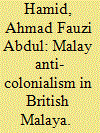

|
|
|
|
|
| Publication |
2007.
|
| Summary/Abstract |
The debate which arose between the ruling United Malays National Organization (UMNO) and the opposition Democratic Action Party (DAP) in early September 2005, concerning the history of Malaysia's independence movement, necessitates a re-appraisal of the organizations and personalities involved. This article re-assesses the period and actors involved in bringing to fruition Malaysian independence. By utilizing mainly authoritative secondary sources, the reconstructed history belies the argument of the ruling elites that they inherit the mantle of `real independence fighters' from their political ancestors. Although the sources are readily available in Malaysian libraries, the truth contained in them has eluded the general public. Thus, to lay people, political history in Malaysia has been what ruling politicians tell them and what they find in school textbooks that, in any case, have been approved by the powers that be. This article reveals that pre-independence Malaysian history is replete with contradictions and paradoxes which may transform perceptions of who were and were not independence heroes.
|
|
|
|
|
|
|
|
|
|
|
|
|
|
|
|
| 9 |
ID:
161482
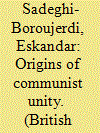

|
|
|
|
|
| Summary/Abstract |
This article analyses the historical emergence of the Organization of Communist Unity, which coalesced out of the National Front of Iran and its Organizations abroad. In the aftermath of the MI6/CIA-orchestrated 1953 coup d’état, a new generation of political activists left Iran for Europe and the United States to pursue their higher education. While politically active in the Organizations of the National Front Abroad, they gradually turned to revolutionary Marxism against the backdrop of the torrential waves of decolonization and resistance to imperial military interventions undulating across the Global South. This same constellation of activists was not only fiercely anti-imperialist, but also opposed any form of dependence on the U.S.S.R. or the People’s Republic of China. They would move from Europe and the United States to establish themselves in several locations across the Arab world, and pursue political activism and their advocacy of guerrilla warfare, as part of their ambition to launch a national liberation struggle against the Pahlavi regime. By examining Communist Unity’s predecessors and their manifold transnational ideological, political and logistical networks with like-minded revolutionary movements inside the Middle East, this article brings to the fore hitherto under-explored South–South connections, and situates Iran’s revolutionary opposition within the global moment of ‘1968’.
|
|
|
|
|
|
|
|
|
|
|
|
|
|
|
|
| 10 |
ID:
188228


|
|
|
|
|
| Summary/Abstract |
This article maps the internationalization of the Palestinian cause by studying the participants, groups, and themes at Palestinian solidarity conferences held in 1969–70. Examining such conferences reveals the extent of communication and ideological debate between the Palestine Liberation Organization (PLO) and international solidarity activists at an important juncture in the internationalization of the Palestinian liberation movement. The article makes the methodological point that international conferences organized by the PLO and other Palestinian institutions can function as an alternative archive that complements the traditional archives of diplomatic and intellectual history. Read in tandem with extant Palestinian sources, the paper trail left by international conferences mitigates the scattered and precarious status of Palestinian archives.
|
|
|
|
|
|
|
|
|
|
|
|
|
|
|
|
| 11 |
ID:
165692


|
|
|
|
|
| Summary/Abstract |
A remarkable feature of the Southern Sudanese liberation movement during the First Sudanese Civil War was its use of anti-colonial discourse and tactics. Soon into their struggle, the Southern Sudanese came to depict their situation as colonisation by the Muslim-Arab elite in Khartoum. As this article argues, this adoption of anti-colonial identity was the outcome of Southern Sudanese interaction with neighbouring Arab and African first-generation liberation movements, through which the future leaders of the Southern Sudanese liberation movement observed and absorbed the practices used against European colonialism. When the Southern Sudanese launched their liberation struggle, these practices shaped their struggle.
|
|
|
|
|
|
|
|
|
|
|
|
|
|
|
|
| 12 |
ID:
181330


|
|
|
|
|
| Summary/Abstract |
Narratives of the Indian revolutionary movement in exile have often focused on abstract notions of ‘London’—with a particular focus on ‘India House’ in Highgate—or ‘Paris’ without taking into account specific geographies of Indian anti-colonialism within these imperial metropoles. Drawing on addresses provided in intelligence reports, this article takes a spatial approach and explores how particular areas of London and Paris enabled the development of the Indian revolutionary movement in exile in the early twentieth century.
|
|
|
|
|
|
|
|
|
|
|
|
|
|
|
|
|
|
|
|
|